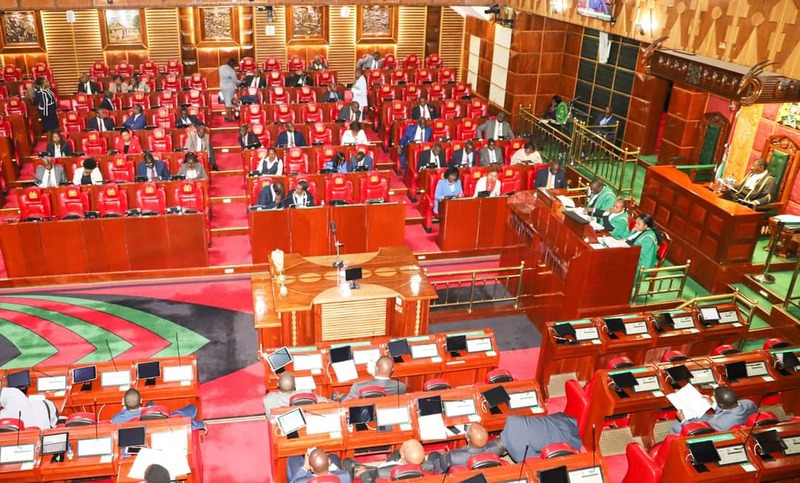Explainer: Key changes introduced by the Privatisation Act, 2023

The Privatisation Act, of 2023, aimed to enhance the regulatory framework governing the privatisation of public entities, aiming to boost the efficiency and competitiveness of Kenya's productive resources among its objectives.
The Privatisation Act, of 2023 became law on October 9, 2023, after President William Ruto assented to it.
Eight months down the line, Githunguri MP Gathoni Wamuchomba says that the passing of the act was the biggest mistake after the Finance Bill, 2024.
More To Read
- National Assembly approves Privatisation Bill to overhaul state corporations
- Challenging the status quo: Githunguri MP Gathoni Wamuchomba tells it all
- Why Sifuna, Wamuchomba’s Kenya Moja outfit could seek the presidency
- Court blocks state from proceeding with sale of 11 parastatals, including KICC
- Githunguri MP Gathoni Wamuchomba says her life is danger
- Githunguri MP Gathoni Wamuchomba summoned by DCI ahead of Ruto’s Kiambu visit
"The biggest parliamentary blunder after Finance Bill 2024 is the passing of the Privatisation Act 2023," she said on Friday.
The UDA legislator questioned that the Act eroded Parliament's power to question the document calling for it to be repealed.
But what does the Act say?
On October 9, 2023, President William Ruto signed the Privatisation Bill into law at the Kisumu State Lodge, thereby enacting it as the Privatisation Act, of 2023.
This new legislation replaces the outdated Privatisation Act of 2005, which predates the 2010 Constitution of Kenya.
The Privatisation Act, of 2023, aimed to enhance the regulatory framework governing the privatisation of public entities, aiming to boost the efficiency and competitiveness of Kenya's productive resources among its objectives.
"It is intended to remove the bureaucratic processes in the privatisation of non-strategic or loss-making government entities," it reads in part.
Key changes introduced by the Privatisation Act, of 2023, include the establishment of the Privatisation Authority and the removal of the requirement for parliamentary approval of its members.
Under this legislation, the Cabinet Secretary assumes responsibility for formulating the privatisation programme, subject to cabinet approval.
The National Assembly will then ratify the programme, with implementation overseen by the Privatisation Authority.
Moreover, the Act introduces four privatisation methods: initial public offering of shares, sale of shares through public tender, sale via pre-emptive rights exercise, and any other method determined by the cabinet.
Privatisation Act, 2023 also allows Treasury to exclude Parliament from approving the sale of State-owned firms in changes aimed at shortening the approval process for the sale of government assets.
In such cases, company shareholders are granted the right to have the first option to buy shares when there is an issuance, with the procedure guided by the entity's charter documents.
The new Act removed methods like liquidation and leasing that had been suggested in the 2005 law.
The Privatisation Act of 2005 requires the Treasury Cabinet Secretary to appoint members to the Privatisation Commission through a competitive process and approval by the National Assembly.
Under the new Act, treasury CS will appoint members of the Privatisation Authority without oversight from Parliament, handing the exchequer a greater role in the entity's running.
The Act proceeds from the sale of a direct National Government shareholding shall be paid into the Consolidated Fund.
It also provides for the establishment of the Privatisation Review Board to determine disputes and appeals under the Act or any other written law.
It also provides for any ongoing privatisation under the Privatisation Act, 2005 to be finalised in accordance with the Privatisation Act, 2023.
The Privatisation Act 2023 reverses the privatisation of state agencies that occurred in 2009.
However, the Act excludes certain transactions from its scope.
Specifically, it does not apply to the sale of shares in the secondary market, shares sold by social security, compensation, superannuation, insurance, or endowment funds under public control for the benefit of their contributors.
In addition, it excludes the sale of new shares to existing shareholders through rights issues, any balance sheet reorganization that could dilute the percentage of shares held by a public entity, or the sale or transfer of shares by a county government.
Top Stories Today













































